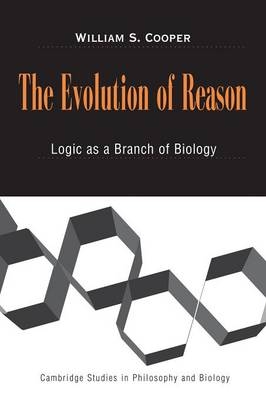
The Evolution of Reason
Logic as a Branch of Biology
Seiten
2003
Cambridge University Press (Verlag)
978-0-521-54025-4 (ISBN)
Cambridge University Press (Verlag)
978-0-521-54025-4 (ISBN)
In this book, William S. Cooper outlines a theory of rationality in which logical law emerges as an intrinsic aspect of evolutionary biology. This biological perspective on logic, though at present unorthodox, could change traditional ideas about the reasoning process.
The formal systems of logic have ordinarily been regarded as independent of biology, but recent developments in evolutionary theory suggest that biology and logic may be intimately interrelated. In this book, William Cooper outlines a theory of rationality in which logical law emerges as an intrinsic aspect of evolutionary biology. This biological perspective on logic, though at present unorthodox, could change traditional ideas about the reasoning process. Cooper examines the connections between logic and evolutionary biology and illustrates how logical rules are derived directly from evolutionary principles, and therefore have no independent status of their own. Laws of decision theory, utility theory, induction, and deduction are reinterpreted as natural consequences of evolutionary processes. Cooper's connection of logical law to evolutionary theory ultimately results in a unified foundation for an evolutionary science of reason. It will be of interest to professionals and students of philosophy of science, logic, evolutionary theory, and cognitive science.
The formal systems of logic have ordinarily been regarded as independent of biology, but recent developments in evolutionary theory suggest that biology and logic may be intimately interrelated. In this book, William Cooper outlines a theory of rationality in which logical law emerges as an intrinsic aspect of evolutionary biology. This biological perspective on logic, though at present unorthodox, could change traditional ideas about the reasoning process. Cooper examines the connections between logic and evolutionary biology and illustrates how logical rules are derived directly from evolutionary principles, and therefore have no independent status of their own. Laws of decision theory, utility theory, induction, and deduction are reinterpreted as natural consequences of evolutionary processes. Cooper's connection of logical law to evolutionary theory ultimately results in a unified foundation for an evolutionary science of reason. It will be of interest to professionals and students of philosophy of science, logic, evolutionary theory, and cognitive science.
1. The biology of logic; 2. The evolutionary derivation of life-history strategy theory; 3. The evolutionary derivation of decision logic; 4. The evolutionary derivation of inductive logic (Part I); 5. The evolutionary derivation of deductive logic; 6. The evolutionary derivation of inductive logic (Part II); 7. The evolutionary derivation of mathematics; 8. Broadening the evolutionary base of classical logic; 9. The evolutionary derivation of nonclassical logic; 10. Radical reductionism in logic; 11. Toward a unified science of reason; Appendix: formal theory.
| Erscheint lt. Verlag | 10.11.2003 |
|---|---|
| Reihe/Serie | Cambridge Studies in Philosophy and Biology |
| Zusatzinfo | 28 Line drawings, unspecified |
| Verlagsort | Cambridge |
| Sprache | englisch |
| Maße | 152 x 229 mm |
| Gewicht | 360 g |
| Themenwelt | Geisteswissenschaften ► Philosophie ► Logik |
| Geisteswissenschaften ► Psychologie ► Verhaltenstherapie | |
| Naturwissenschaften ► Biologie | |
| ISBN-10 | 0-521-54025-9 / 0521540259 |
| ISBN-13 | 978-0-521-54025-4 / 9780521540254 |
| Zustand | Neuware |
| Haben Sie eine Frage zum Produkt? |
Mehr entdecken
aus dem Bereich
aus dem Bereich
ein Gegenentwurf zum kurzfristigen Denken : so werden wir zu den …
Buch | Hardcover (2023)
REDLINE (Verlag)
CHF 27,90


